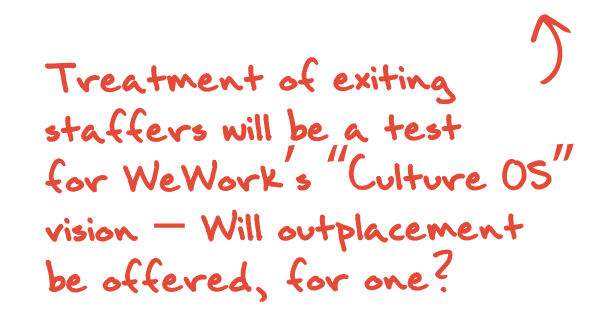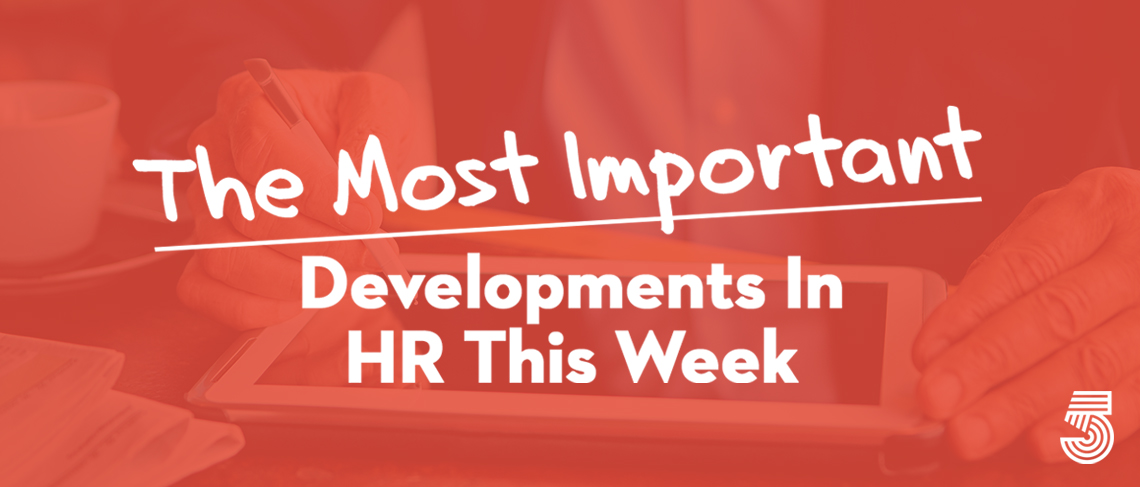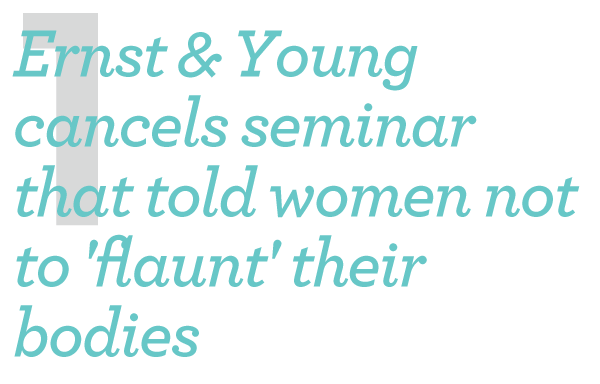
This, from CBS News: “Ernst & Young has backtracked after defending a training seminar that encourages its female executives to conform to gender stereotypes. The program was prepared by a third-party vendor and suggested that women who work at E&Y should have good haircuts, manicured nails, and refrain from showing skin so as not to distract their male counterparts. (It also went on to explain that women’s brains are smaller than men’s.) E&Y said it is reviewing ‘processes and controls around program content’ to ensure no similar mistakes occur.” Now, from us: We were curious about this wholly outrageous seminar, called “Power-Presence-Purpose” so we did some digging and found something interesting that hasn’t been reported in the news. “Purpose Power Presence” is a UK-based, totally legit, highly regarded company that does seminars for women. Marsha Clark and Associates, the “third-party vendor” that created and conducted the E&Y seminar with an eerily similar title, has taken down its website. A cautionary tale for HR pros. Completely vet your training from third-party vendors. CBS News
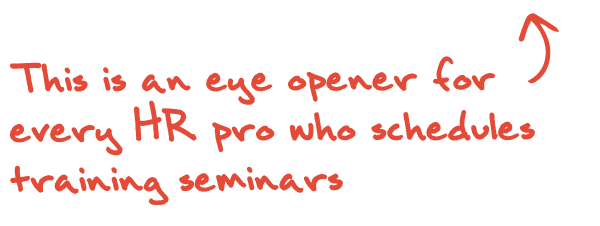
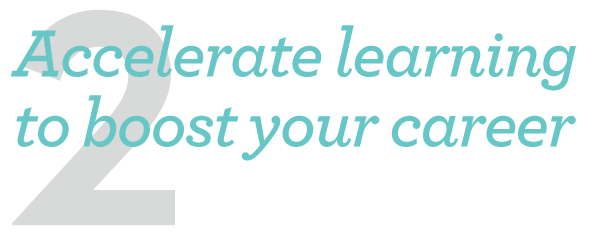
The guest on the most recent Ideacast from HBR is Scott Young, who gained fame for teaching himself the four-year MIT computer science curriculum in just 12 months. He says that the type of fast, focused learning he employed is possible for all of us — whether we want to master coding, become fluent in a foreign language, or excel at public speaking. And, in a dynamic, fast-paced business environment that leaves so many of us strapped for time and struggling to keep up, he believes that the ability to quickly develop new knowledge and skills will be a tremendous asset. After researching best practices and experimenting on his own, he has developed a set of principles that any of us can follow to become “ultralearners.” Young is the author of the book Ultralearning: Master Hard Skills, Outsmart the Competition, and Accelerate Your Career. HBR Ideacast
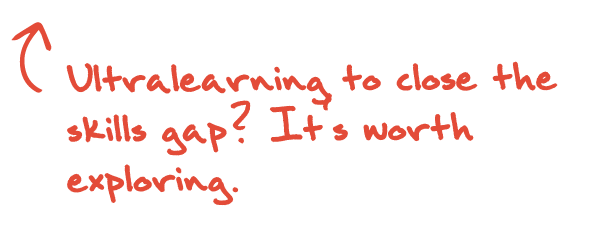
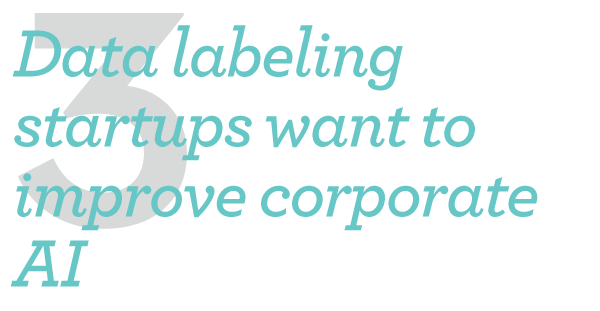
Corporate boards are besotted with artificial intelligence. Worldwide spending on AI is expected to rise from $38 billion this year to $98 billion by 2023, estimates IDC, a research firm. So far, though, only one in five companies aware of the technology’s potential has incorporated machine learning into its core business. One reason for the slow uptake is the dearth of quality data to teach algorithms to perform useful tasks. The most common form of AI, called “supervised learning,” requires feeding software stacks of pre-tagged examples of, say, cat pictures until it can tell a feline image apart by itself. Data-labeling is the sort of grunt work that corporate AI users would prefer someone else to do for them. An industry is popping up to help. The market for data-labeling services may triple to $5 billion by 2023, reckons Astasia Myers of Redpoint Ventures. Some outfits, like Mechanical Turk (owned by Amazon), act as middlemen connecting freelancers ready to perform all manner of “micro-tasks,” of which things like tagging pictures is one example, with taskmasters. Other firms specialize. Hive has turned data-labeling into something “like playing Candy Crush,” explains its boss, Kevin Guo. Its mobile app makes it easy for users to identify objects, earning money instead of points. Its 1.5 million players across the world serve more than 100 corporate customers. The Economist


Part of Inc.’s “Ask a 20-Something” series highlights the problem with entry-level jobs. It’s blistering. Here’s a snapshot: Q. “When I was in my 20s, I worked hard, paid my dues, and earned my next spot up the ladder. But now, my young entry-level workers bristle when I ask them to do the hard work that I expect. How do I get them to understand that nobody can simply jump that line?” A: “The game has changed since you were in your 20s. Take a minute or two to forget pretty much everything you’ve come to believe in the last 40 years. First, a lot of entry-level tasks, like updating spreadsheets, can be automated. If your employees have to spend an hour filling out TPS reports that a computer could do in 30 seconds, they have a right to be indignant. Second, when you got started, you probably had a crappy entry-level job. You worked your way up until you could afford the life you wanted outside of work. It was a worthy model. Now, it’s totally obsolete. Fast-forward to 2019: The rewards don’t seem attainable to me, or to anyone else I know. Young people famously can’t afford houses, and it’s not because we eat too much avocado toast. Student-loan debt in the U.S. is at an all-time high. $1.4 trillion. So, no, I’m not going to patiently endure needless grunt work while I wait my turn to tackle a real project.” Inc.
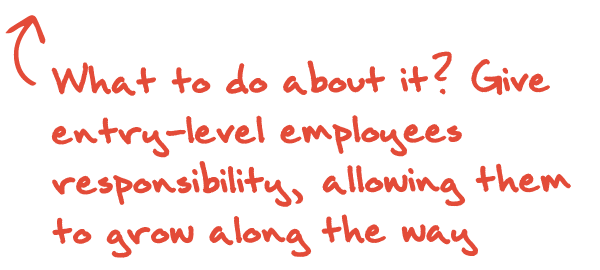
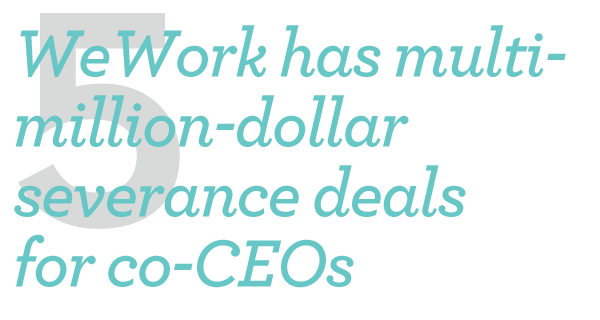
As WeWork, the beleaguered office-sharing startup, prepares to fire thousands of rank-and-file staff to cut costs, its board has agreed on severance packages for its co-CEOs if they leave, according to people with knowledge of the matter. In the past week, WeWork’s board signed off on exit deals for Artie Minson and Sebastian Gunningham in the multi-million-dollar range, said one of the people, who requested anonymity because the agreements are private. The severance arrangements were negotiated as SoftBank Group Corp. bailed out the company and on Tuesday named one of its executives, Marcelo Claure, as WeWork’s executive chairman. For now, Minson and Gunningham are committed to WeWork, according to one of the people. They were appointed last month when co-founder and former CEO Adam Neumann stepped down following the company’s withdrawal of a planned initial public offering. Late Tuesday, WeWork secured a $9.5 billion lifeline, and Neumann gave up his board seat. He is set to walk away with as much as $1 billion from the sale of WeWork stock, a $500 million credit line from SoftBank, and a roughly $185 million consulting fee, people familiar with the matter have said. Bloomberg
